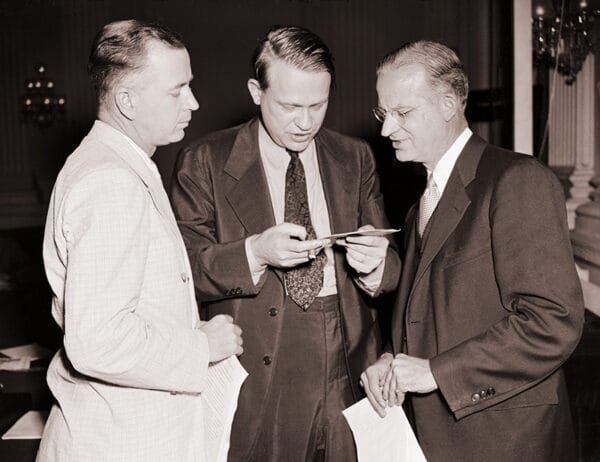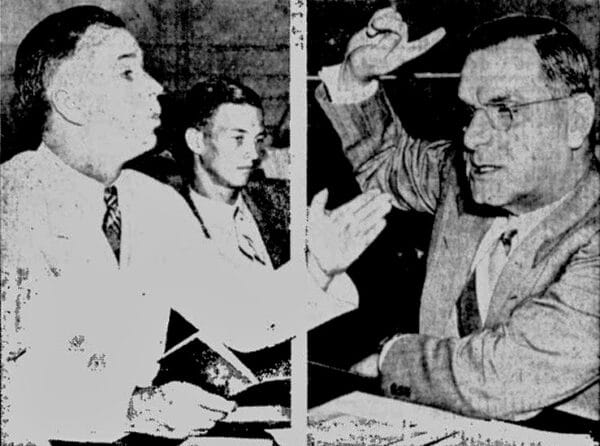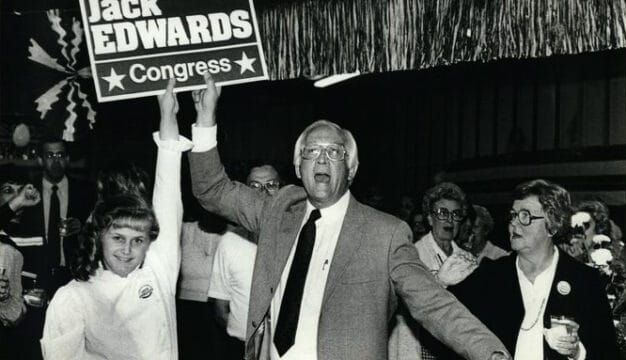Joe Starnes
Joe Starnes (1895-1962) served in both World War I and World War II and represented Alabama’s Fifth Congressional District from January 1935 to January 1945. Originally an educator, Starnes served on the Alabama State Board of Education prior to his election to the U.S. Congress. Despite his support for many of the Progressive ideals of the New Deal era, he also was known as a staunch and outspoken advocate of segregation. In his later life, he devoted much of his time to his law practice.
 Starnes, Dies, and Matthews
Joe Starnes was born in Guntersville, Marshall County, on March 31, 1895. He was named after Alabama governor Joseph F. Johnston who knew the family, but shortened his name to simply Joe Starnes. His father, John Starnes, was a farmer and his mother, Mary Boyd Perkins Starnes, was a homemaker; he had two sisters and three brothers. He attended public schools and then became a school teacher in the county in 1912. In 1917, after America’s entry into World War I, Starnes served as a second lieutenant in the Fifty-third Infantry Regiment of the Sixth Division of the U.S. Army. The division was partially organized at Camp McClellan and arrived in France during the summer of 1918; it trained and fought with the French Eighth Army in the area of the Vosges Mountains.
Starnes, Dies, and Matthews
Joe Starnes was born in Guntersville, Marshall County, on March 31, 1895. He was named after Alabama governor Joseph F. Johnston who knew the family, but shortened his name to simply Joe Starnes. His father, John Starnes, was a farmer and his mother, Mary Boyd Perkins Starnes, was a homemaker; he had two sisters and three brothers. He attended public schools and then became a school teacher in the county in 1912. In 1917, after America’s entry into World War I, Starnes served as a second lieutenant in the Fifty-third Infantry Regiment of the Sixth Division of the U.S. Army. The division was partially organized at Camp McClellan and arrived in France during the summer of 1918; it trained and fought with the French Eighth Army in the area of the Vosges Mountains.
After returning home from the war, Starnes married Della Whitaker. The couple would have two boys. Starnes earned a law degree from the University of Alabama, graduating in 1921 and passing the bar the same year. He then opened his own law practice in Guntersville and joined the Alabama National Guard in 1923 as a member of the 167th Infantry Regiment, eventually advancing to the rank of colonel. In 1931, Starnes’s unit was tasked with protecting the nine African American defendants in the Scottsboro trials from a lynch mob. By the time Starnes and his men arrived to protect the jail holding the young men, the crowd had calmed, however. When called to testify, Starnes reportedly frustrated the defense attorney, who hoped his testimony would reinforce the need for a change of venue given the air of hostility surrounding the trial. Starnes instead stated that the crowd was mostly calm while he was present and attributed their presence to mere curiosity rather than as a threat to the young men. In 1933, Starnes began serving as a member of the Alabama State Board of Education.
In 1934, Starnes decided to run as a Democrat for the seat in Congress for Alabama’s Fifth Congressional District. In the Democratic primary, he faced not only the incumbent Miles Clayton Allgood but former senator and congressman J. Thomas Heflin, who sought a return to politics. Heflin was known across the state for his oratorical and debating skills and for his outspoken and fiery support of white supremacy. Facing both an entrenched incumbent and the well-known Heflin, Starnes achieved an unexpected victory.
 Fritz Kuhn and Joe Starnes
Starnes took office in 1935 and supported Pres. Franklin Roosevelt and his New Deal social and economic programs, but he remained an ardent opponent of African American civil rights. Starnes was described as being viciously racist in The Crisis, an NAACP-affiliated magazine, and was criticized for using his legislative powers to push for the continued existence of segregated housing in both the North and the South. During the years prior to World War II, Starnes was fiercely anti-fascist and anti-communist and also was known for voting against organized labor and had accused trade unions in the Birmingham area of harboring communists. He later made headlines on several occasions during his time serving on the House Un-American Activities Committee (HUAC), created to uncover supposed subversive activities in the United States. Starnes was ridiculed in the popular media following his questioning of Hallie Flanagan of the Federal Theater Project, during which he suggested that sixteenth-century British playwright Christopher Marlowe was a communist, despite his having died hundreds of years before Karl Marx was born. He also gained national attention following a committee hearing with Fritz Kuhn, leader of the pro-Nazi German American Bund organization. After Starnes’s questioning of Kuhn became heated, he rushed through the crowd gathered at the hearing in an attempt to attack Kuhn, who had risen from his seat and appeared ready to fight as well. Starnes was stopped by police and returned to his chair, allowing the hearing to continue.
Fritz Kuhn and Joe Starnes
Starnes took office in 1935 and supported Pres. Franklin Roosevelt and his New Deal social and economic programs, but he remained an ardent opponent of African American civil rights. Starnes was described as being viciously racist in The Crisis, an NAACP-affiliated magazine, and was criticized for using his legislative powers to push for the continued existence of segregated housing in both the North and the South. During the years prior to World War II, Starnes was fiercely anti-fascist and anti-communist and also was known for voting against organized labor and had accused trade unions in the Birmingham area of harboring communists. He later made headlines on several occasions during his time serving on the House Un-American Activities Committee (HUAC), created to uncover supposed subversive activities in the United States. Starnes was ridiculed in the popular media following his questioning of Hallie Flanagan of the Federal Theater Project, during which he suggested that sixteenth-century British playwright Christopher Marlowe was a communist, despite his having died hundreds of years before Karl Marx was born. He also gained national attention following a committee hearing with Fritz Kuhn, leader of the pro-Nazi German American Bund organization. After Starnes’s questioning of Kuhn became heated, he rushed through the crowd gathered at the hearing in an attempt to attack Kuhn, who had risen from his seat and appeared ready to fight as well. Starnes was stopped by police and returned to his chair, allowing the hearing to continue.
In 1937, Starnes was briefly considered as a replacement for outgoing Alabama senator Hugo Black after his appointment by Pres. Roosevelt to the U.S. Supreme Court. Lister Hill, however, would go on to secure the position. Starnes again ran for a seat in the U.S. House of Representatives in 1944 but lost the Democratic primary to the more liberal Albert Rains. The Crisis and other liberal groups attributed his defeat to the efforts of the Congress of Industrial Organizations (CIO), a federation of union workers.
After his defeat by Albert Rains, Starnes reenlisted in the Army and served overseas as a colonel, serving in the European theater from January 4, 1945, until the end of the war in May as a special assistant to General Lucius D. Clay. He later served with the occupation forces in Japan until he was discharged on February 22, 1946, and was awarded the European-African-Middle Eastern Campaign Medal and the American Defense Service Medal for his military service. Starnes returned to his law practice in partnership with his son, Joe Jr., but continued to participate in politics. He unsuccessfully challenged Rains for his former seat in 1946 and in 1950 was considered a potential competitor to Lister Hill, but he decided to sit out the Senate race. In 1948, he became vice chairman of the Alabama State Board of Education, serving for a year.
Starnes was an active member of Civitan International, a volunteer organization concerned with community needs and helping those with developmental disabilities headquartered in Birmingham. Starnes received several civic honors, including having the Guntersville airport being christened the Joe Starnes Field. He died in Washington, D.C. on January 9, 1962, and was interned in Guntersville City Cemetery.



